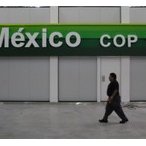
30 de noviembre de 2010 | Noticias | Justicia climática y energía | COP 16
Black and White
Friends of the Earth warns about the threat of REDD at the COP16
Descargar: MP3 (1.1 MB)
In the beginning of the negotiations on climate change of the United Nations, the federation of environmentalist organizations Friends of the Earth International launched a report that shows that the mechanism known as “Reducing Emissions from Deforestation in Developing Countries” (REDD) will cause more harm than good.
According to the federation in their report “REDD: the Realities in Black and White”, the plantations established under REDD represent a threat in countries where there are tropical rainforests, and can be detrimental for the outcomes on deforestation at the 16th Conference of the Parties (COP) to the United Nations Framework Convention on Climate Change, which started on Monday in Cancun, Mexico.
Case studies carried out by the member groups of the environmentalist federation show that these projects are damaging native peoples and local communities, while they benefit big transnational corporations –such as BP and Shell- that see in REDD a mechanism that allows them to obtain profits.
"Governments are promoting dangerous proposals on forests through the UN climate talks which would imperil communities and the environment. These case studies show that a race is underway by corporate investors to profit from forestry schemes which will do nothing to reduce emissions and would harm local communities", said Joseph Zacune, FoEI Climate Justice Program Coordinator.
Also, the report warns that there is an almost direct link between REDD and the carbon markets at the UN negotiations, which “would further multiply the risks of relying on the vagaries of carbon markets and prices”. “This would also allow the privatization of forests to generate carbon credits so that rich industrialized countries could buy the right to pollute”, according to a press release issued on Monday by Friends of the Earth.
In addition, the federation states that these mechanisms could allow continued logging of natural forests, since due to a weak UN definition of forests they could be replaced with industrial tree plantations.
Photo: Amigos de la Tierra Internacional








